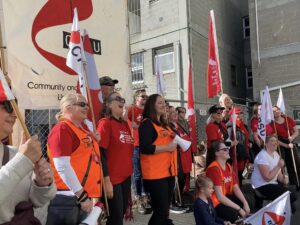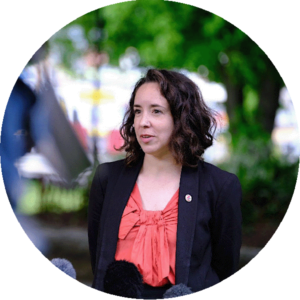
The CPSU Member claim this Public Sector Unions Wage Agreement is standing up for better recognition of DPFEM Forensic Experts and Forensic Science Tasmania Members.
One of these members is CPSU Delegate Forensic Biologist Paul Holloway.
“I like to think that our work helps Tasmanians in our justice system by providing them with support, especially when they come forward as a victim of crime. Our job is to put any scientific evidence found into a form where the court can understand it. We’re there as experts, not to take one side or the other, but to say, here’s what we found, and this is what it means. We add to the story and hopefully bring it to a place where everyone has a better chance of getting justice.”
We chatted to Paul about the Claim and how it helps to recognise and value the work of these experts.
Easier progression
Paul said that many workers were performing work at a higher level, but it was hard for them to progress in their careers.
Many of the scientists and technical staff in my workplace have been here for a long time. They have gained expertise, experience and valuable skills, but some of them have come up against a barrier to move up to the next band, or are denied the chance to work in an area matching their abilities and qualifications.
Paul said these workers still went over and above despite their lack of ability to progress.
They’ve been here in some cases for 15-20 years, and you’d think they’d be saying “why bother putting the effort in”, as it’s so hard to progress, but they still come to work full of ideas and enthusiasm, with ways to improve the system. I think that they deserve something more, especially as they are operating at a higher level. They could easily sit back and do the routine job, and no one could blame them, but they continue making useful contributions, innovations, and improvements that benefit everyone.
If we had a career structure that allowed people to progress from Level One to Three, we could offer young, enthusiastic new graduates a reasonable path to move all the way through. With the current workplace structure and lack of a mechanism for progression we have a very disruptive and wasteful process. We train people whose only career option is to go and work elsewhere, and we have to go through the process of hiring someone else – essentially training people, who we would like to keep, for other workplaces.”
Paul said easier progression between levels would help recognise the work of these staff.
Recognition for workers who attend crime scenes
Attending a crime scene can be confronting, difficult work and more recognition of this is needed for forensics staff.
The CPSU Member Claim includes a Crime Scene Allowance for those required to be on the Crime Scene Roster.
Paul explains:
There are very few people on our Crime Scene roster, and it takes a long time to train someone up to have all the necessary skills.
Being on-call and going to crime scenes can be quite a stressful and confronting job, so people often don’t stay on the roster for more than a few years. It’s disruptive – you’re often on the roster one week out of three. When you’re on call you can’t be more than half an hour away from work, you can’t do anything that would affect your ability to work, and you still have to do your regular day-time job. Any plans have to be made with the idea that you could be interrupted at any time of the day or night.
In COVID times, there was a situation where there was only one person who wasn’t unwell on the roster – that person had to work from home, so that they didn’t risk getting sick. That could’ve been a real problem.
Paul said a second or third person always attends a Crime Scene, even though they didn’t get paid an on-call allowance.
“Most of the time, the second and third un-rostered people say ‘yes’ to attending a scene, despite the fact that they have no obligation to. The phone call could be at 2am on a Sunday to drive somewhere three hours away. We rely purely on their good-will. They should be getting some sort of allowance. It often feels like their enthusiasm is being exploited.
Read more about the CPSU claim for Police, Fire and Emergency Management workers at www.cpsu.com.au/psuwa/dpfem/
For Forensics specifically, the CPSU Claim includes:
- Crime Scene Allowance for those required to be on the Crime Scene roster.
- Payment of overtime for attending court on days not rostered to work.
- For all overtime to be paid at double time including time attending court on days not rostered on
- The establishment of a professional development fund for fingerprint experts to meet the costs of maintaining AFSAB expert accreditation
- That an additional 5 days of recreation leave be provided for employees required to attend mortuaries to take samples/fingerprint deceased persons or who attend crime scenes involving deceased persons or exposure to bodily fluids.
Your stories are powerful.
Tell us your stories about working DPFEM here and how the CPSU Member Claim would improve your life, work, and service to the community. We can share these anonymously. They help to highlight the need for decent rights, voice and pay.








